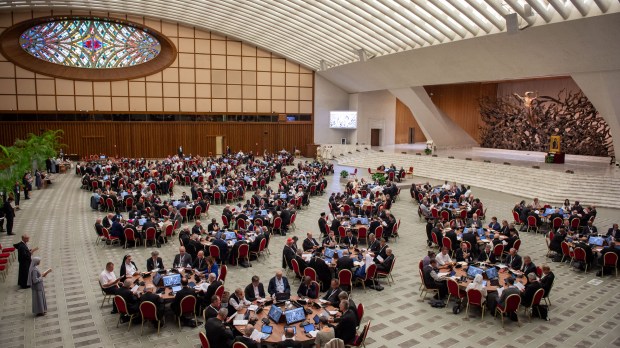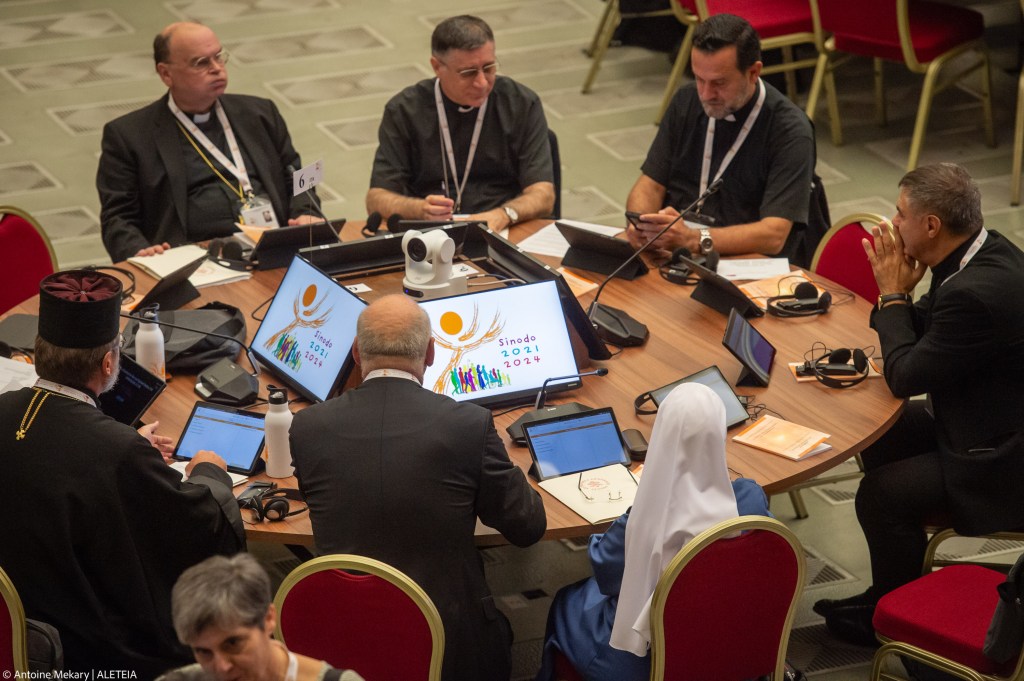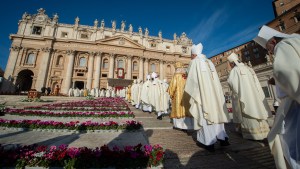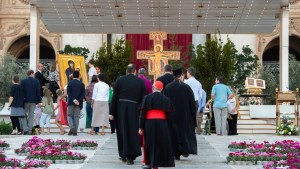“If the Holy Spirit is not among us, the Synod will not bear good results,” warned Pope Francis at the first General Assembly of the Synod on the Future of the Church, this October 4, 2023. As the Synod opened, he issued a warning to journalists, lamenting that previous synods had been polluted by debates from public opinion. He expressed the hope that silence and listening would prevail during this month of work.
In the Vatican’s Paul VI Hall, the 365 members of the Synod took part in their first General Congregation this afternoon. In an impromptu address, Pope Francis emphasized that the “Synod is not a parliament,” repeating a phrase already used on various occasions. Most recently, he had used the expression a few hours earlier at the Synod’s opening mass in St Peter’s Square.
Round tables have been set up in the Paul VI Hall to facilitate conversation and listening during the Synod.
Rejecting worldliness, gossip, and public pressure
Giving some advice to this assembly of bishops, religious, and lay men and women, he invited them to reject “voices that do not come from the Spirit”, “worldliness” and “gossip.”
“If you don’t agree with what that bishop, that sister, or that layman is saying, tell him to his face. Because this is a synod,” the Pope insisted.
In a message addressed directly to journalists and communicators, he denounced the way in which previous synods had, in his view, been the object of media pressure. As an example, he referred to the issue of divorced and remarried people, which became the focus of attention at the Synod on the Family in 2014-2015. He also mentioned the Special Synod Assembly on the Pan-Amazon Region, during which the theme of the ordination of married men had come to the fore. “We entered the Synod under that pressure,” he said sadly.
On the subject of the current Synod, he noted that “hypotheses” had again arisen from the outside, such as “the priesthood for women.”
“The Church needs to take a pause”
Faced with all these divisive debates, the Pope called for a “pause.”
“The Church has come to a halt, just as the apostles halted after Good Friday. (…) They did it out of fear, but that’s not our case,” the Pope said wryly. Peter’s Successor insisted on the importance of this “pause of the whole Church to listen,” which in itself constitutes “the most important message.”
He called for “asceticism,” a “fast” from public speaking during the Synod. These words follow on from his statements at the ecumenical vigil on September 30. After a long period of silence observed by the crowd gathered in St. Peter’s Square, Francis pleaded for a climate of “silence” so as not to be influenced by “ideologies” and “polarization.”
“Truth does not need loud cries to reach people’s hearts,” he said, surrounded by the heads of other Christian Churches.
Strict rules for communication
The Pope’s insistence on a climate of silence and listening is reflected in the regulations sent out by the Holy See Press Office a few minutes after the 86-year-old Pontiff took the floor.
“In order to guarantee the freedom of expression of each person’s thoughts, and to ensure the serenity of discernment in common — the principal task entrusted to the Assembly — each participant is bound to confidentiality and discretion regarding both his own interventions and those of the other participants. This duty remains in force after the end of the Synodal Assembly,” it states. “All participants are forbidden to record, film or divulge their interventions in the general congregations and working groups,” it goes on to say.
A few days before the opening of the synod, the prefect of the dicastery for Communication, Paolo Ruffini, had denied any desire to impose “secrecy” for this synod, preferring to use the word “confidentiality.”
For nearly a month, most general assemblies and sharing groups will be held behind closed doors. Synod proceedings will not be broadcast, in order to preserve “a sacred space” for exchanges between members. There will, however, be regular official briefings on the progress of the work, as well as press conferences.
Persistent requests for clarification
This call for silence comes just hours after the turmoil caused by the publication on Monday of 5 dubia — Latin for “doubts” — issued in July by cardinals concerned about the possible direction of the Synod. As the Holy See’s response did not reassure them, these five cardinals have reformulated their questions, which concern in particular the blessing of homosexual couples and the ordination of women.




